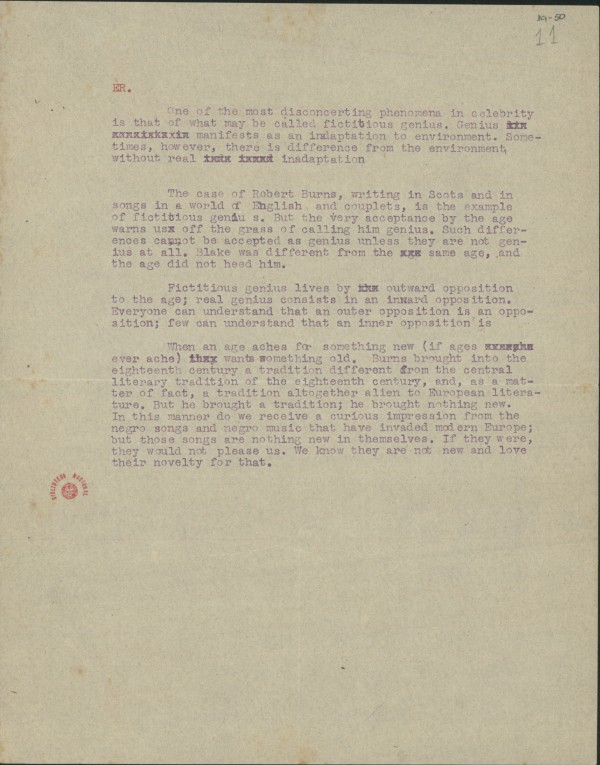Identificação
[19 – 50]
Erostratus.
One of the most disconcerting phenomena in celebrity is that of what may be called fictitious genius. Genius manifests as an inadaptation to environment. Sometimes, however, there is difference from environment without real inadaptation {…}
The case of Robert Burns, writing in Scots and in songs in a world of English and couplets, is the example of fictitious genius. But the very acceptance by the age warns us off the grass of calling him genius. Such differences cannot be accepted as genius unless they are not genius at all. Blake was different from the same age, and the age did not heed him.
Fictitious genius lives by outward opposition to the age; real genius consists in an inward opposition. Everyone can understand that an outer opposition is an opposition; few can understand that an inner opposition is {…}
When an age aches for something new (if ages ever ache) it wants something old. Burns brought into the eighteenth century a tradition different from the central literary tradition of the eighteenth century, and, as a matter of fact, a tradition altogether alien to European literature. But he brought a tradition; he brought nothing new. In this manner do we receive a curious impression from the negro songs and negro music that have invaded modern Europe; but those songs are nothing new in themselves. If they were, they would not please us. We know they are not new and love their novelty for that.
[19 – 50]
Heróstrato.
Um dos fenómenos mais desconcertantes na celebridade é aquilo a que se pode chamar génio fictício. O génio manifesta-se como uma inadaptação ao meio. Por vezes, contudo, existe a diferença relativamente ao meio sem uma verdadeira inadaptação {…}
O caso de Robert Burns, escrevendo em escocês e em canções num mundo do inglês e de couplets, é o exemplo de génio fictício. Mas a própria aceitação pela época adverte-nos a chamá-lo génio. Tais diferenças não podem ser aceites como génio, a não ser que não sejam, de modo nenhum, génio. Blake era diferente da mesma época e a época não lhe deu ouvidos.
O génio fictício vive da oposição exterior à época; o génio real consiste em oposição interior. Todos conseguem compreender que uma oposição exterior seja uma oposição; pouco conseguem compreender que uma oposição interior seja {…}
Quando uma época anseia por algo novo (se é que as épocas alguma vez anseiam), ela quer algo antigo. Burns trouxe para o século XVIII uma tradição diferente da tradição literária central do século XVIII e, com efeito, uma tradição inteiramente estranha à literatura europeia. Mas ele trouxe uma tradição; não trouxe nada de novo. Recebemos de modo semelhante uma impressão curiosa das canções negras e da música negra que adentrou a europa moderna; mas essas canções não são em si mesmas nada de novo. Se fossem, não nos teriam agradado. Sabemos que não são novas e gostamos da sua novidade por isso.
Classificação
Dados Físicos
Dados de produção
Dados de conservação
Palavras chave
Documentação Associada
Publicação integral: Fernando Pessoa, Heróstrato e a Busca da Imortalidade, edição de Richard Zenith, Lisboa, Assírio & Alvim, 2000, pp. 147-148.


